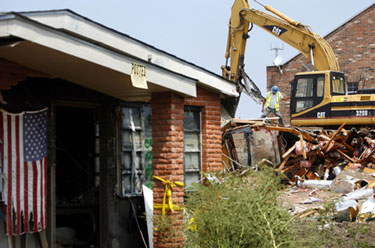
(FinalCall.com) – A recent report indicates that U.S. corporations and government entities are waxing rich off no-bid contracts and layers of contracting pyramids in the Gulf Coast region while multitudes of displaced residents struggle for work and daily survival in the aftermath of Hurricane Katrina.
CorpWatch, a non-profit organization that tracks corporate influence and its consequences, recently released “Big Easy Money: Disaster Profiteering on the American Gulf Coast” as its third in a series of reports on major construction projects over the last five years. The others were “Iraq, Inc.” and “Afghanistan, Inc.”
Authored by Rita King, “Big Easy Money” primarily found that, among other things: Many of the same “disaster profiteers” and government agencies (the Army Corps, Bechtel and Halliburton) that mishandled the reconstruction of Afghanistan and Iraq are responsible for the failure of “reconstruction” of the Gulf Coast Region; abusive “contracting pyramids” that leave the actual subcontractors doing the work with only a tiny amount of the money paid by the federal government; local companies go unpaid or are frozen out of the process altogether; and laborers, particularly immigrant workers, are not getting paid.
“For instance, a company out of Florida, which is paid the largest amount of money to clean up Katrina debris, $23 for every cubic yard, subcontracts the work, but the man and woman doing the cleaning actually got $3 per cubic yard,” stated Pratap Chatterjee, executive director of CorpWatch. “That’s 85 percent of the money going to overhead, and that’s exactly what you’ll see in Iraq.”
Another obstruction, Mr. Chatterjee continued, is contingency contracting–advancing money not on what is now, but for what will come. “The problem is that somebody in Virginia who knows how to go to distant places very quickly will get the contract,” he explained. “So the person who knows how to help, the local company that knows where the roads are, are left out.”
CorpWatch also uncovered scores of contracts awarded to well-connected, yet unqualified, companies, such as Bourgets of the South and Carnival Cruise Lines. According to Mr. Chatterjee, Bourgets, a custom motorcycle dealership, won three no-bid contracts over $100 million to provide 6,400 FEMA trailers, despite the absence of a license to sell trailers or a franchise agreement. Carnival Cruise lines, he said, rented three ships to provide temporary housing with full boats tallying $1,275 per week per person, whereas a Carnival holiday tour of the Gulf totals approximately $500–nearly three times less the cost for shelter, entertainment and luxury than for temporary housing due to a national disaster.
According to Ajamu Baraka, director of the U.S. Human Rights Network, sobering similarities are occurring in the Mississippi Gulf region. “We find that the subcontractors will play the African American community against the largely undocumented working community,” he remarked. “It’s obvious, but I don’t think that some of the Black leadership has concentrated on the consequences of these subcontractors bringing in and exploiting the undocumented workers.”
Of those consequences, Mr. Baraka noted, elements of working class Blacks who could use employment to repair their lives have been excluded from the labor force to enable large corporations to bring in a labor force paid far less than prevailing Gulf Coast wages.
“Instead of allowing the community that left to return, the corporations are replacing one population of workers with another,” he argued, “a population of workers that in most cases are not only going to be temporary once their usefulness is over, but will be thrown aside.”
The human rights advocate cited the restoration work on casinos as contributing to the situation. “This is the only industry being restored right now and there’s very little development taking place in the communities. They are almost back operating and it’s rumored that the governor and George Bush would be in Biloxi this month to reopen one of the major casinos,” Mr. Baraka noted. Though bizarre, it is business as usual he said.
In the short term, Mr. Chatterjee noted, companies get very rich and nothing gets fixed. The long-term impact is that people will not return to New Orleans and the Gulf Coast, and money will continue to be wasted.
“Then, there is the cultural shift that is a long-term change. New Orleans is less of a Black city today, less of the various cultures that have kept it going and thriving as a cultural center. That will change and this is the tragedy,” he insisted, “because people will have hard lives because they don’t have their communities anymore.”
Mr. Chatterjee proposes forging accountability and transparency through government auditors and independent journalists.
Mr. Baraka added that resolution rests within the affected population itself. “The ties that we have in this phase is to engage in more effective more militant, political organizing,” he said. “We have to build a Gulf Coast reconstruction movement in which the center of that leadership is the African American working class.”
The Save Our Selves Coalition’s LaTosha Brown believes that self-determination is an important factor for repair and reconstruction of lives and cities.
“We, as a people, have to be a bit more determined, not just those in the affected areas. We have seen some help, but for the level of devastation and tragedy that has fallen on this community, the collective community has not responded appropriately,” she observed.
She is referring to the Vietnamese neighborhood in New Orleans East once known as Versailles, which rebuilt approximately 45 of its 53 businesses and gutted 95 percent of its homes to transform the neighborhood with little help from the government.
“I think our whole community was in shock, angry and mad, and we all cried. But it’s one thing to feel it and it’s another to do something about it,” she implored. “It’s time for us to transform those feelings and emotions that we felt into love for our people.”
(CorpWatch’s trilogy on Disaster Profiteering may be viewed online at www.corpwatch.org.)












